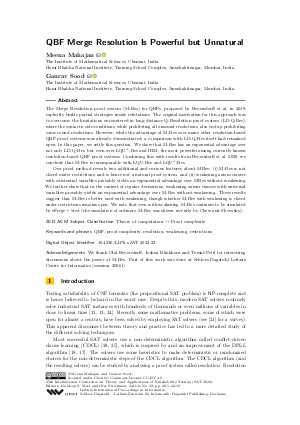@InProceedings{mahajan_et_al:LIPIcs.SAT.2022.22,
author = {Mahajan, Meena and Sood, Gaurav},
title = {{QBF Merge Resolution Is Powerful but Unnatural}},
booktitle = {25th International Conference on Theory and Applications of Satisfiability Testing (SAT 2022)},
pages = {22:1--22:19},
series = {Leibniz International Proceedings in Informatics (LIPIcs)},
ISBN = {978-3-95977-242-6},
ISSN = {1868-8969},
year = {2022},
volume = {236},
editor = {Meel, Kuldeep S. and Strichman, Ofer},
publisher = {Schloss Dagstuhl -- Leibniz-Zentrum f{\"u}r Informatik},
address = {Dagstuhl, Germany},
URL = {https://drops-dev.dagstuhl.de/entities/document/10.4230/LIPIcs.SAT.2022.22},
URN = {urn:nbn:de:0030-drops-166969},
doi = {10.4230/LIPIcs.SAT.2022.22},
annote = {Keywords: QBF, proof complexity, resolution, weakening, restrictions}
}

 Creative Commons Attribution 4.0 International license
Creative Commons Attribution 4.0 International license

